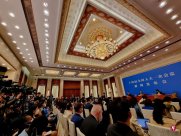China National People's Conference Spokesperson Wang Chao said that there is no fundamental strategic differences and strategic differences between Central Europe and the European Europe.Conflicts, but have a wide range of common interests and long -term accumulated cooperation foundations, we should maintain communication and negotiation with a constructive attitude.
Wang Chao said at the press conference of the National People's Congress on Saturday (March 4), saying that since last year, Chinese President Xi Jinping was with French President Macron and German Chancellor Toshrz., European Council Chairman Michelle and other European leaders frequently interacted and reached an important consensus. "It can be said that the stable development of China -Europe relations last year."The leaders of China and Europe have unanimously agreed to promote the healthy and stable development of China -Europe relations, oppose the "New Cold War" with camp confrontation, and oppose economic decoupling. They both advocate maintaining the international system with the United Nations as the core.Essence
Wang Chao criticized that in recent years, some people have rendered that China -Europe is an institutional opponent. It has been drumming China's challenges and Chinese threats. It is because of the Cold War thinking and ideological bias.The fundamental and long -term interests of China and Europe.
He emphasized that China always regards Europe as a comprehensive strategic partner, supports the European Union's strategic autonomy, and supports the EU to play a constructive role in international affairs.Dialogue cooperation, expanding trade and two -way investment, working together to respond to global challenges such as climate change, and promote political solution to international and regional hotspots.
This year's National People's Congress will open on the morning of Sunday (March 5), closing on the morning of March 13, and the meeting is eight and a half days.There are nine agendas of the conference this year, including six reports such as reviewing government work reports, the proposal of the Legislative Law of the People's Republic of China (amending the draft), reviewing the reform plan of the State Council, and deciding to appoint national institutions for components.



